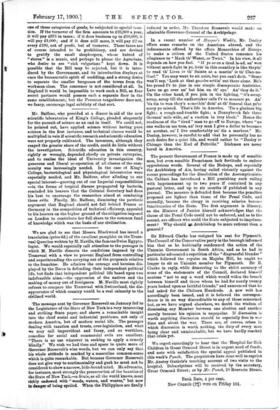Mr. Balfour, who presided at a dinner in aid of
the new scientific laboratories of King's College, pleaded eloquently for the pursuit of science as an end in itself. We could not, be pointed out, have applied science without having pure science in the first instance, and technical classes would be multiplied in vain if scientific research and scientific education were not properly cultivated. The inventors, although they reaped the greater share of the credit, could do little without the investigators. Scientific education in this country, rightly or wrongly, depended chiefly on private enterprise, and to realise the ideal of University investigation the generous and liberal co-operation of all classes of the com- munity was increasingly needed. In the case of King's College, bacteriological and physiological laboratories were especially needed, and Mr. Balfour, after alluding to our special interest—growing out of our Imperial responsibilities —in the forms of tropical disease propagated by bacteria, reminded his hearers that the Colonial Secretary had done his best to encourage the researches aimed at combating these evils. Finally, Mr. Balfour, dismissing the patriotic argument that England should not fall behind France or Germany in the competition of technical efficiency, appealed to his hearers on the higher ground of the obligation imposed on London to contribute her full share to the common fund of knowledge which was the basis of our civilisation.






































 Previous page
Previous page